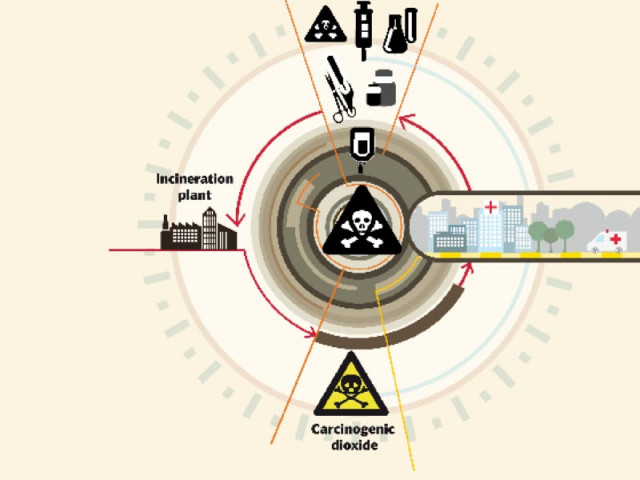Medical waste: What cures you may end up killing you - if not disposed properly
Poor management of medical waste spreads diseases in the community, say experts.

Poor management of medical
waste spreads diseases in the community, say experts.DESIGN: MUNIRA ABBAS
Medical waste from hospitals may end up spreading more diseases, such as cancer and hepatitis, warn experts.
If not handled properly, waste generated at hospitals - such as, used needles and syringes, soil dressings, diagnostic samples, blood, chemicals, medical equipment and radioactive material - can cause more damage than the initial treatment it was used for.
“Poor management of healthcare waste spreads out diseases to not just healthcare workers and waste handlers but also the community at large,” Qazi Athar, an expert on environmental law told The Express Tribune.
To treat such waste, the government has set up incineration plants, he said. Athar felt, however, that international research has rendered this technique outdated. Most countries are shutting down incineration plants, but unfortunately in Pakistan they are working systematically, he pointed out.
According to him, incineration plants are hazardous for human health as they release a “carcinogenic dioxide” gas, which causes cancer. They are also harmful for the nutrition of animals and agriculture and are not recommended by the World Health Organisation.

According to Pakistan Medical Association’s Dr Qaisar Sajjad, apart from Aga Khan University Hospital, no other hospital in the city has a proper disposal system that falls within international standards. There is no modern scientific waste management system working here, he added.
“Improper disposal of medical waste is a menace for the whole society,” said a member of NGO Shehri-Citizens for a Better Environment, Khatib Ahmed, adding that the health department uses incineration plants that burn the waste and create environmental pollution. Ahmed pointed out that scavengers also collect used syringes from medical waste dumped outside hospitals and sell them to different companies. If these used syringes make their way back into the market, that is even more lethal, he warned.
Incineration plants in the city
“Only 10 incineration plants are functional,” Athar pointed out, adding that Karachi’s 612 private and government hospitals produce 30 tonnes of waste every day.
Two of these incineration plants are being run by the Karachi Metropolitan Corporation (KMC), two are being run private pharmaceutical companies, Abbot and Brooks, and six are being run by teaching hospitals, such as Jinnah, Civil, Kidney Centre, Liaquat National, Aga Khan and Ziauddin . All these plants combined are, however, incapable of disposing of all the medical waste that the city’s hospitals generate, he added.
Dr Sajjad regretted that a large number of hospitals, clinic, maternity homes and laboratories have been established around every corner of the city without proper registration and these hospitals are dumping their waste just outside their doors. “There is a need for proper legislation so that all hospitals overcome this menace,” he said.
Former city Nazim Mustafa Kamal informed that during his tenure, the city government had installed two incineration plants, which they have ability to burn 2,000 kilogramme waste at a time. “These plants are unable to dispose all the medical waste of the city which is why the administration should install more plants,” said Kamal.
According to Dr Qaiser Sajjad, the Pakistan Medical Association had earlier installed more than three incineration plants at Sobhraj Maternity Hospital, Qatar Hospital and Abbasi Shaheed - but most of them are out of order. “The KMC incinerators are the only functional ones but they have ability to dispose only 20 to 30 per cent waste while the others hospitals are dumping their waste openly,” he said.
The medical superintendent of Karachi Civil Hospital, Dr Saeed Qureshi, said that the hospital produces 200 kilogrammes infected and non-infected medical waste per day. “We hired private contractors who collect the medical waste from the hospital but unfortunately, most of the medical waste, including syringes and drip’s rubber pipes, are being sold openly with the help of hospital’s employees and administration,” he admitted. “The incineration plant of the hospital stopped working two years ago, after which we started using KMC’s.”
Administration director at JPMC, Chaudhry Muhammad Akram, however, said that their incineration plant was fully functional and disposing the medical waste properly.”
Highly infectious
Hospital waste is a special type of waste carrying high potential of infection and injuries, informed Dr Sajjad. “The proper management of healthcare waste depends on good administration and organisation along with good legislation.”
What makes matters worse is that the landfill sites are also not constructed along scientific lines, he said, adding that most incinerators do not have proper filters. When hospital waste is burnt, toxic gas and chemicals are discharged into the air and that can be potentially carcinogenic, he informed. “The situation is alarming and it needs immediate action on the part of the government and providers of health facilities,” he said.
Published in The Express Tribune, August 18th, 2013.



















COMMENTS
Comments are moderated and generally will be posted if they are on-topic and not abusive.
For more information, please see our Comments FAQ